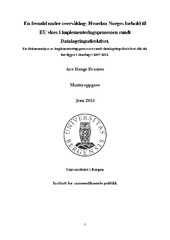| dc.description.abstract | This master study is a discourse analysis on the Norwegian relationship to the European Union. It investigates this through a discourse analysis of the implementation process on Directive 2006/24/EC about data retention as it is represented in the debate in the Norwegian parliament Stortinget. Directive 2006/24/EC was and is a controversial directive in Norway, and the debate on implementation of this directive was the first time Stortinget debated wether or not to use the veto" granted in the EEA-treaty. As a result, I argue that through analyzing the discourse on the implementation process, we can aid our understanding of Norway's relationship with the EU, as it is seen from the Norwegian Storting. The documents that have been analyzed were produced by either members of parliament, ministers of government, the Justice Department and the Foreign Department between the year 2007 and 2012. I find that the dominant discourses are focused on the relationship between individual and state. These are represented by the discourses on privacy, freedom, rule of law, and combatting crime. Other notable discourses are on the relationship between Norway and the EU as it pertains to dependency, solidarity and maintenance of Norwegian sovereignty. Surprisingly, the economic discourse, which is typical for discourse on the EU, has a less central role in the discourse on the implementation of Directive 2006/24/EC. Within the discourses, the relationship with the EU has an important, yet rarely central position. The actors argue from a national standpoint, yet they draw on European experiences continuously. The relationship to the EU is rarely far from the debate, but internal matters are given more importance. The discourses are tied to the ideology and the interests of the actors that use them. The debate on Directive 2006/24/EC is inseparable from the political parties struggle for scoring electoral points through the showcasing their ideology in the parliamentary debates. In the end, I find that the Norwegian parliaments relationship with the EU is multifaceted; it is a source for learning; for fear of a weakened national sovereignty; an organization whose cooperation we depend on; whose members we share traits with; the EU is a necessary source for trade and economic growth; and that brings us unpopular and needless directives, that at its worst demands that we implement what is perceived as either intrusive and freedom-limiting or necessary crime-fighting techniques. Thanks to the political, geographic and economic context Norway exists in, our relationship with the EU will always be of the greatest importance. | en_US |
